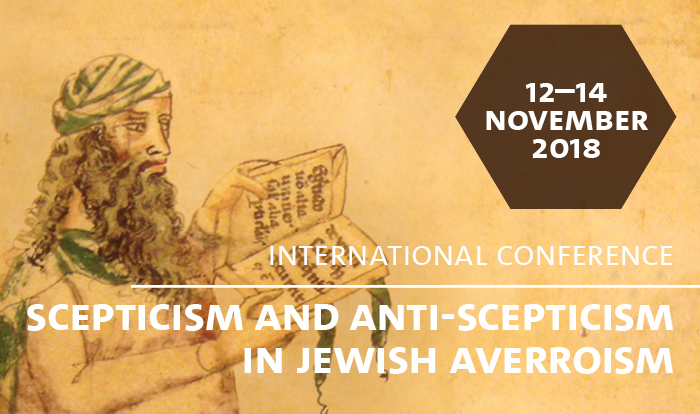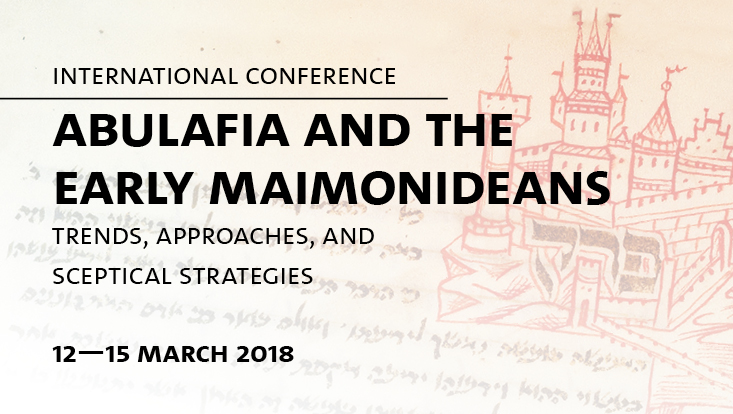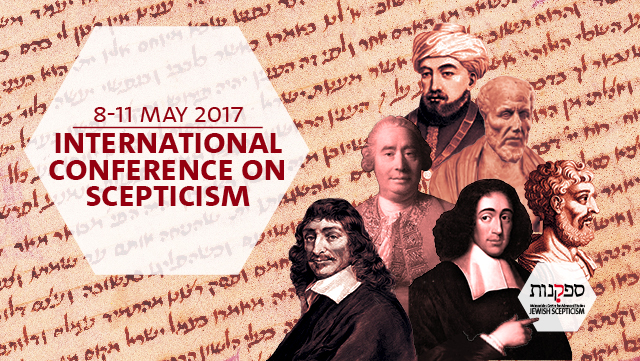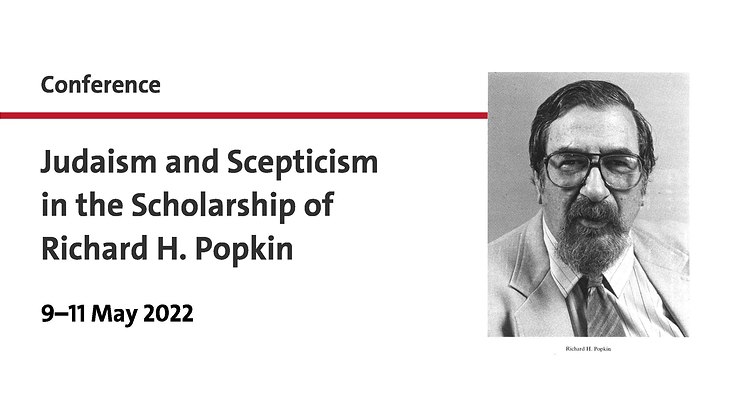Conferences
2024: The Significance of Scepticism in Philosophy, Judaism, and Culture
THE SIGNIFICANCE OF SCEPTICISM IN PHILOSOPHY, JUDAISM, AND CULTURE
21–24 July 2024
Hamburg, Germany
Abstract
The value of scepticism in philosophy has been judged differently: while Pyrrhonist sceptics conceived of scepticism as a way to happiness, later philosophers – especially in the early modern period – conceived of it as a malady from which we cannot be cured. Yet, for all this disagreement these philosophers agreed that scepticism is deeply bound up with our human condition: our predicament of being finite and yet having to come to terms with an infinite complex world. As research at MCAS over the previous years has shown, scepticism is also relevant for other domains of human thought and practice, which are equally affected by our finite nature, which prevents us from attaining certainty.
Keynote Speaker
- Giuseppe Veltri (Universität Hamburg)
Participants
- Richard Bett (John Hopkins University)
- Daniel Boyarin (University of California, Berkeley)
- Michael Della Rocca (Yale University)
- Yehuda Halper (Bar Ilan University)
- Zev Harvey (Hebrew University of Jerusalem)
- Ehud Krinis (Ben Gurion University of the Negev)
- Adi Louria Hayon (Tel Aviv University)
- Diego Lucci (American University in Bulgaria)
- Diego Machuca (CONICET, Argentina)
- Yitzhak Melamed (John Hopkins University)
- Chiara Rover (Universität Hamburg)
- Stephan Schmid (Universität Hamburg)
- Johanna Schmitt (Eberhard Karls Universität Tübingen)
- Andreas Speer (Universität zu Köln)
- Josef Stern (The University of Chicago)
Poster
[Link]
Programme
[Link]
Venue
Maimonides Centre for Advanced Studies
Please contact MCAS for further information and registration. A Zoom-Link can be requested to follow the conference remotely:
2022: Judaism and Scepticism in the Scholarship of Richard H. Popkin
© Photograph: Jeremy Popkin
Date
9–11 May 2022
Convenors
- Jeremy Popkin (University of Kentucky, Lexington)
- Asher Salah (Bezalel Academy of Arts and Design)
- Giuseppe Veltri (Universität Hamburg)
Abstract
Richard Popkin’s scholarly interest in Judaism appears relatively late in his academic career, following what he described as an “overpowering religious experience” that took place in 1956. His contributions to Jewish history are prevalently focused on the role of Marrano thinkers in early modern scepticism and in Christian messianism and millenarianism. Therefore, recent scholarship on Jewish scepticism has rightly stressed that Popkin’s multifarious oeuvre lacks any serious consideration of a specifically Jewish current within the sceptical tradition, which is independent from the converso encounter with classical philosophy and Christian theology.
However, in his correspondence and autobiographical writings, Popkin did acknowledge the importance of his Jewish identity in shaping his intellectual interests and directing his research on scepticism. In view of the forthcoming publication of Popkin’s correspondence with Judah Goldin edited by Giuseppe Veltri, Jeremy Popkin, and Asher Salah, this conference aims to further our understanding of how Popkin’s strong commitment to Judaism affected his perception of Jewish history and Jewish philosophy.
Participants
- Guido Bartolucci (Università della Calabria)
- Avner Ben-Zaken (Ono Academic College)
- Carlos Cañete (Universidad Autónoma de Madrid)
- Cristiana Facchini (Università di Bologna)
- Andrew L. Gluck (Hofstra University)
- Matt Goldish (Ohio State University)
- Thomas Kaal (Queen Mary University London)
- David Katz (Brandeis University)
- Joseph Levi (Shemah Institute, Florence)
- Diego Lucci (American University in Bulgaria)
- Claude Stuczynski (Bar-Ilan University Ramat-Gan)
Programme
[PDF]
Poster
[PDF]
Publications
Popkin, Jeremy D., Asher Salah, and Giuseppe Veltri, eds. A Sceptical Jew. Richard H. Popkin’s Private Republic of Letters. Leiden, The Netherlands: Brill, 2024.
[link]
2019: Simone Luzzatto's Scepticism in the Context of Early Modern Thought
 © Das Traumschaukelschiff, Martin Schwarz (1999)
© Das Traumschaukelschiff, Martin Schwarz (1999)
Date
23–25 September 2019
Convenors
- Anna Lissa (Universitè Paris 8/ France)
- Michela Torbidoni (Universität Hamburg/ Germany)
- Giuseppe Veltri (Universität Hamburg/ Germany)
Abstract
This conference aims to call attention to the sceptical thought of Rabbi Simone Luzzatto (ca. 1583–1663) and its value within seventeenth-century philosophy and political thought. The three-day conference will take place at the Maimonides Centre for Advanced Studies at Universität Hamburg and will bring together established scholars and young researchers working in the field of the intellectual history of Judaism in the sixteenth and seventeenth centuries. The lectures will offer the opportunity to explore the philosophical sources and strategies of Luzzatto’s scepticism, his intense dialogue with Christian philosophy, and his relationship to Judaism.
The discussion of Luzzatto will provide the chance to investigate the role of scepticism within an era marked by paradoxes and contrasts between religious devotion and scientific rationalism, between rabbinical-biblical Jewish tradition and the open tendency towards engagement with non-Jewish philosophical, literary, scientific, and theological culture.
The conference’s programme will include a round table on Rabbi Simone Luzzatto’s newly published works, Discourse on the State of the Jews (1638) and Socrates, Or On Human Knowledge (1651) to be discussed with the authors and translators.
Participants
- Luca Andreoni (Istituto Comprensivo “Caio Giulio Cesare”)
- Guido Bartolucci (Università della Calabria)
- Evelien Chayes (Radboud Universiteit)
- Cristiana Facchini (Università di Bologna)
- Zev Harvey (Hebrew University of Jerusalem)
- Mina Lee (University of Tokyo)
- Fabrizio Lelli (Università del Salento)
- David Ruderman (University of Pennsylvania)
- Myriam Silvera (Università degli studi di Roma “Tor Vergata”)
- Josef Stern (University of Chicago)
- Vasileios Syros (University of Jyväskylä)
- Joanna Weinberg (University of Oxford)
Programme
[PDF] - UPDATE: September 18, 2019
Poster
[PDF]
Publication
Veltri, Giuseppe, and Michela Torbidoni, eds. Simone Luzzatto’s Scepticism in the Context of Early Modern Thought. Leiden, The Netherlands: Brill, 2024.
[link, Brill webpage]
2018: Scepticism and Anti-Scepticism in Jewish Averroism

Date
November 12–14, 2018
Convenors
- Racheli Haliva (Universität Hamburg/Germany)
- Yoav Meyrav (Universität Hamburg/Germany)
- Daniel Davies (Universität Hamburg/Germany)
Abstract
“Jewish Averroism” is a concept that usually refers to Jewish philosophers from the thirteenth century onwards who philosophised within the context of Averroes’ interpretation of Aristotelian philosophy. At the same time, many of them were committed to Maimonides’ legacy of reconciling philosophical investigation with the Law of Moses. In order to settle this apparent tension, they interpreted Judaism in light of Averroes’ Aristotelianism on the assumption that Judaism and true philosophy must always coincide.
Although Averroes’ philosophy and commentary were attractive to some circles, others found it unsatisfactory or simply threatening to the traditional way of life. These thinkers responded with various critiques of Averroes, his followers, and the Averroistic approach to philosophy and its relationship to revealed religion.
The purpose of the conference is to crystallise the understanding of Jewish Averroism as a philosophical and cultural phenomenon. Special emphasis will be put upon the Jewish Averroists’ engagement with Maimonides’ apparent sceptical approach, mainly concerning metaphysical knowledge, about which Averroes is patently dogmatic. Finally, lectures about various aspects of anti-Averroism will serve as a necessary counterbalance.
Participants
- Giada Coppola (Universität Hamburg/Germany)
- Daniel Davies (Universität Hamburg/Germany)
- Esti Eisenmann (The Open University of Israel)
- Michael Engel (Universität Hamburg/Germany)
- Resianne Smidt van Gelder-Fontaine (University of Amsterdam/Netherlands)
- Alexander Green (University at Buffalo/USA)
- Racheli Haliva (Universität Hamburg/Germany)
- Yehuda Halper (Bar-Ilan University, Ramat-Gan/Israel)
- Steven Harvey (Bar-Ilan University, Ramat-Gan/Israel)
- Zev Harvey (Hebrew University of Jerusalem/Israel)
- Hanna Kasher (Bar-Ilan University, Ramat-Gan/Israel)
- Bakinaz Abdalla (McGill University, Montreal/Canada)
- Rebecca Kneller-Rowe (Tel Aviv University/Israel)
- Maud Kozodoy (New York University/USA)
- Daniel Lasker (Ben-Gurion University of the Negev, Beer-Sheva/Israel)
- Reimund Leicht (Hebrew University of Jerusalem/Israel)
- David Lemler (Université de Strasbourg/France)
- Giovanni Licata (Scuola Normale Superiore di Pisa/Italy)
- Yoav Meyrav (Universität Hamburg/Germany)
- Mercedes Rubio (POLIS Jerusalem/Israel)
- Adrian Sackson (Tel Aviv University/Israel)
- Shalom Sadik (Ben-Gurion University of the Negev, Beer-Sheva/Israel)
- Yonatan Shemesh (University of Chicago/USA)
- Shira Weiss (Herzl Institute, Jerusalem/Israel)
Poster
[PDF]
Programme
[PDF]
Abstracts
[PDF]
Publication
Haliva, Racheli, Yoav Meyrav, and Daniel Davies, eds. Averroes and Averroism in Medieval Jewish Thought. Boston, Leiden: Brill, 2024.
[Link, Brill webpage]
2018: Abulafia and the Early Maimonideans: Trends, Approaches, and Sceptical Strategies
 Date
Date
Date
12–15 March 2018
Convenor
- Racheli Haliva (Universität Hamburg/Germany)
Participants
- David Abulafia (University of Cambridge/UK)
- Adam Afterman (Tel Aviv University/Israel)
- Daniel Davies (Universität Hamburg/Germany)
- Ofer Elior (Ben-Gurion University of the Negev, Beer-Sheva and Hebrew University of Jerusalem/Israel)
- Steven Harvey (Bar-Ilan University, Ramat-Gan/Israel)
- Zev Harvey (Hebrew University of Jerusalem/Israel)
- Gitit Holtzman (Levinsky College Tel Aviv/Israel)
- Moshe Idel (Hebrew University of Jerusalem/Israel)
- Hanna Kasher (Bar-Ilan University, Ramat-Gan/Israel)
- Arje Krawczyk (Jewish Historical Institute, Warsaw/Poland)
- Haim Kreisel (Ben-Gurion University of the Negev, Beer-Sheva/Israel)
- Fabrizio Lelli (Università del Salento/Italy)
- Elke Morlok (Goethe-Universität Frankfurt/Germany)
- José María Sánchez de León Serrano (Universität Hamburg/Germany)
- Yossi Schwartz (Tel Aviv University/Israel)
- Josef Stern (University of Chicago/USA)
Abstract
The conference focuses on the different trends and sceptical attitudes Maimonideanism took in the thirteenth and fourteenth centuries by examining various approaches to major religious topics such as the nature of the Torah, the commandments, the Hebrew language, the people of Israel, and the land of Israel. This comparative approach points to distinctive philosophical trends—as represented by ibn Tibbon, Shem Tov ibn Falquera, Joseph ibn Caspi, Levi ben Abraham, Isaac Albalag, Moshe Narboni, Zerahyah Hen, and Hillel of Verona—focusing on major Jewish religious topics. Among these trends, the place of Abraham Abulafia and the early writings of R. Joseph Gikatilla, who wrote some forms of commentaries on Maimonides’ Guide of the Perplexed stands out. The questions to be asked are whether it is possible to draw a map of radical versus conservative Maimonideanism and whether the two Kabbalists are as radical as the philosophers when dealing with the same topics.
Poster
[PDF]
Programme
[PDF]
2017: International Conference on Scepticism

Scepticism from Antiquity to Modern Times
Date
8–11 May 2017
Abstract
The First International Conference on Scepticism at the University of Hamburg, organised by the Maimonides Centre for Advanced Studies in close co-operation with the Department of Philosophy at La Sapienza University of Rome, addresses the main elements, strategies, and definitions of scepticism with a focus on ancient, medieval, and early modern philosophy. A group of established professors and young scholars working on PhDs and post-docs will lecture on the main questions of sceptical philosophy, such as the criteria for defining and distinguishing ancient scepticism from modern scepticism and the debates on the existence and meaning of a Jewish (anti-) scepticism.
Poster
[PDF]
Programme
[PDF]
Lecture2Go
[link]
Publication
Haliva, Racheli, Stephan Schmid, Emidio Spinelli, and Giuseppe Veltri, eds. Sceptical Paths. Enquiry and Doubt from Antiquity to the Present. Berlin, Boston: De Gruyter, 2019.
[link]

